Comprehensive Report on Entrepreneurship: Ventures, Impact, Success
VerifiedAdded on 2023/04/04
|15
|4369
|85
Report
AI Summary
This report provides a comprehensive analysis of entrepreneurship, examining different types of entrepreneurial ventures, including small businesses, large companies, public and private ventures, and their respective roles, characteristics, and objectives. It assesses the economic impact of micro and small businesses at local, regional, national, and international levels, highlighting their importance in job creation, innovation, and overall economic growth. The report further explores the characteristics, skills, and motivations of successful entrepreneurs, considering the influence of personal backgrounds and experiences on their entrepreneurial journeys. By investigating diverse entrepreneurial ventures and analyzing relevant data and statistics, this report offers valuable insights into the scope, development, and growth of entrepreneurship and its impact on various levels of the economy. Desklib provides access to this and many other solved assignments for students.

UNDERSTANDING
ENTREPRERSHIP
ENTREPRERSHIP
Paraphrase This Document
Need a fresh take? Get an instant paraphrase of this document with our AI Paraphraser
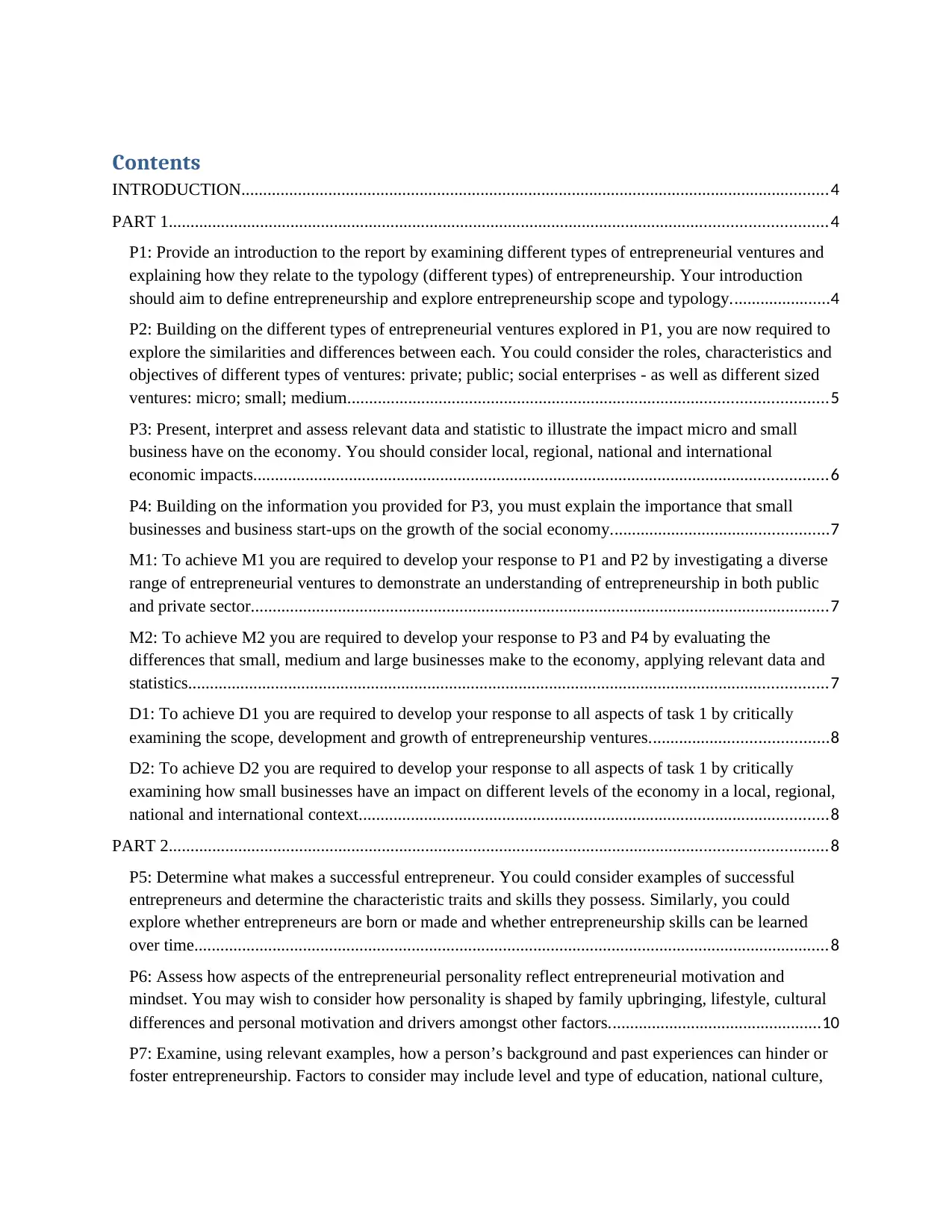
Contents
INTRODUCTION.......................................................................................................................................4
PART 1.......................................................................................................................................................4
P1: Provide an introduction to the report by examining different types of entrepreneurial ventures and
explaining how they relate to the typology (different types) of entrepreneurship. Your introduction
should aim to define entrepreneurship and explore entrepreneurship scope and typology.......................4
P2: Building on the different types of entrepreneurial ventures explored in P1, you are now required to
explore the similarities and differences between each. You could consider the roles, characteristics and
objectives of different types of ventures: private; public; social enterprises - as well as different sized
ventures: micro; small; medium..............................................................................................................5
P3: Present, interpret and assess relevant data and statistic to illustrate the impact micro and small
business have on the economy. You should consider local, regional, national and international
economic impacts....................................................................................................................................6
P4: Building on the information you provided for P3, you must explain the importance that small
businesses and business start-ups on the growth of the social economy..................................................7
M1: To achieve M1 you are required to develop your response to P1 and P2 by investigating a diverse
range of entrepreneurial ventures to demonstrate an understanding of entrepreneurship in both public
and private sector.....................................................................................................................................7
M2: To achieve M2 you are required to develop your response to P3 and P4 by evaluating the
differences that small, medium and large businesses make to the economy, applying relevant data and
statistics...................................................................................................................................................7
D1: To achieve D1 you are required to develop your response to all aspects of task 1 by critically
examining the scope, development and growth of entrepreneurship ventures.........................................8
D2: To achieve D2 you are required to develop your response to all aspects of task 1 by critically
examining how small businesses have an impact on different levels of the economy in a local, regional,
national and international context............................................................................................................8
PART 2.......................................................................................................................................................8
P5: Determine what makes a successful entrepreneur. You could consider examples of successful
entrepreneurs and determine the characteristic traits and skills they possess. Similarly, you could
explore whether entrepreneurs are born or made and whether entrepreneurship skills can be learned
over time..................................................................................................................................................8
P6: Assess how aspects of the entrepreneurial personality reflect entrepreneurial motivation and
mindset. You may wish to consider how personality is shaped by family upbringing, lifestyle, cultural
differences and personal motivation and drivers amongst other factors.................................................10
P7: Examine, using relevant examples, how a person’s background and past experiences can hinder or
foster entrepreneurship. Factors to consider may include level and type of education, national culture,
INTRODUCTION.......................................................................................................................................4
PART 1.......................................................................................................................................................4
P1: Provide an introduction to the report by examining different types of entrepreneurial ventures and
explaining how they relate to the typology (different types) of entrepreneurship. Your introduction
should aim to define entrepreneurship and explore entrepreneurship scope and typology.......................4
P2: Building on the different types of entrepreneurial ventures explored in P1, you are now required to
explore the similarities and differences between each. You could consider the roles, characteristics and
objectives of different types of ventures: private; public; social enterprises - as well as different sized
ventures: micro; small; medium..............................................................................................................5
P3: Present, interpret and assess relevant data and statistic to illustrate the impact micro and small
business have on the economy. You should consider local, regional, national and international
economic impacts....................................................................................................................................6
P4: Building on the information you provided for P3, you must explain the importance that small
businesses and business start-ups on the growth of the social economy..................................................7
M1: To achieve M1 you are required to develop your response to P1 and P2 by investigating a diverse
range of entrepreneurial ventures to demonstrate an understanding of entrepreneurship in both public
and private sector.....................................................................................................................................7
M2: To achieve M2 you are required to develop your response to P3 and P4 by evaluating the
differences that small, medium and large businesses make to the economy, applying relevant data and
statistics...................................................................................................................................................7
D1: To achieve D1 you are required to develop your response to all aspects of task 1 by critically
examining the scope, development and growth of entrepreneurship ventures.........................................8
D2: To achieve D2 you are required to develop your response to all aspects of task 1 by critically
examining how small businesses have an impact on different levels of the economy in a local, regional,
national and international context............................................................................................................8
PART 2.......................................................................................................................................................8
P5: Determine what makes a successful entrepreneur. You could consider examples of successful
entrepreneurs and determine the characteristic traits and skills they possess. Similarly, you could
explore whether entrepreneurs are born or made and whether entrepreneurship skills can be learned
over time..................................................................................................................................................8
P6: Assess how aspects of the entrepreneurial personality reflect entrepreneurial motivation and
mindset. You may wish to consider how personality is shaped by family upbringing, lifestyle, cultural
differences and personal motivation and drivers amongst other factors.................................................10
P7: Examine, using relevant examples, how a person’s background and past experiences can hinder or
foster entrepreneurship. Factors to consider may include level and type of education, national culture,
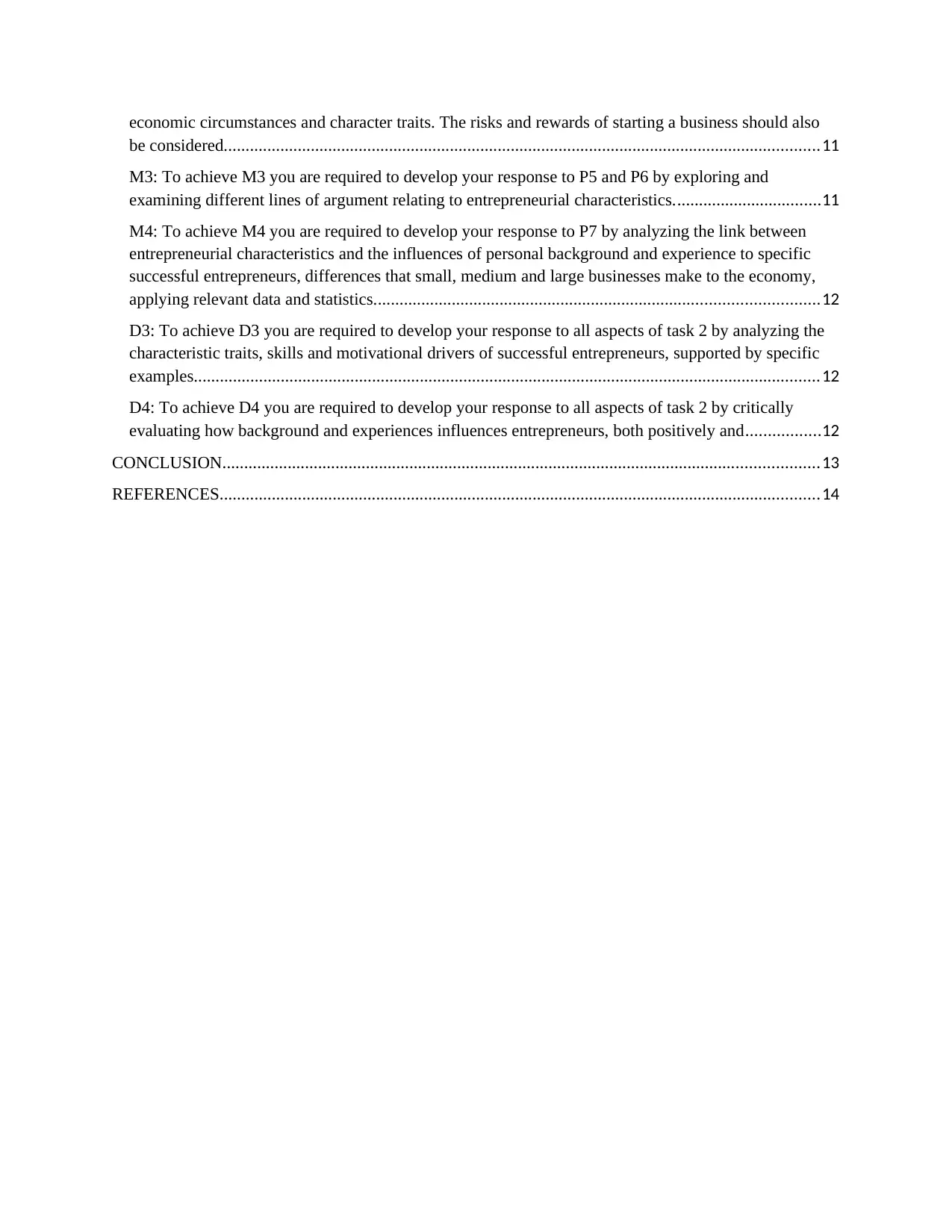
economic circumstances and character traits. The risks and rewards of starting a business should also
be considered.........................................................................................................................................11
M3: To achieve M3 you are required to develop your response to P5 and P6 by exploring and
examining different lines of argument relating to entrepreneurial characteristics..................................11
M4: To achieve M4 you are required to develop your response to P7 by analyzing the link between
entrepreneurial characteristics and the influences of personal background and experience to specific
successful entrepreneurs, differences that small, medium and large businesses make to the economy,
applying relevant data and statistics......................................................................................................12
D3: To achieve D3 you are required to develop your response to all aspects of task 2 by analyzing the
characteristic traits, skills and motivational drivers of successful entrepreneurs, supported by specific
examples................................................................................................................................................12
D4: To achieve D4 you are required to develop your response to all aspects of task 2 by critically
evaluating how background and experiences influences entrepreneurs, both positively and.................12
CONCLUSION.........................................................................................................................................13
REFERENCES..........................................................................................................................................14
be considered.........................................................................................................................................11
M3: To achieve M3 you are required to develop your response to P5 and P6 by exploring and
examining different lines of argument relating to entrepreneurial characteristics..................................11
M4: To achieve M4 you are required to develop your response to P7 by analyzing the link between
entrepreneurial characteristics and the influences of personal background and experience to specific
successful entrepreneurs, differences that small, medium and large businesses make to the economy,
applying relevant data and statistics......................................................................................................12
D3: To achieve D3 you are required to develop your response to all aspects of task 2 by analyzing the
characteristic traits, skills and motivational drivers of successful entrepreneurs, supported by specific
examples................................................................................................................................................12
D4: To achieve D4 you are required to develop your response to all aspects of task 2 by critically
evaluating how background and experiences influences entrepreneurs, both positively and.................12
CONCLUSION.........................................................................................................................................13
REFERENCES..........................................................................................................................................14
⊘ This is a preview!⊘
Do you want full access?
Subscribe today to unlock all pages.

Trusted by 1+ million students worldwide
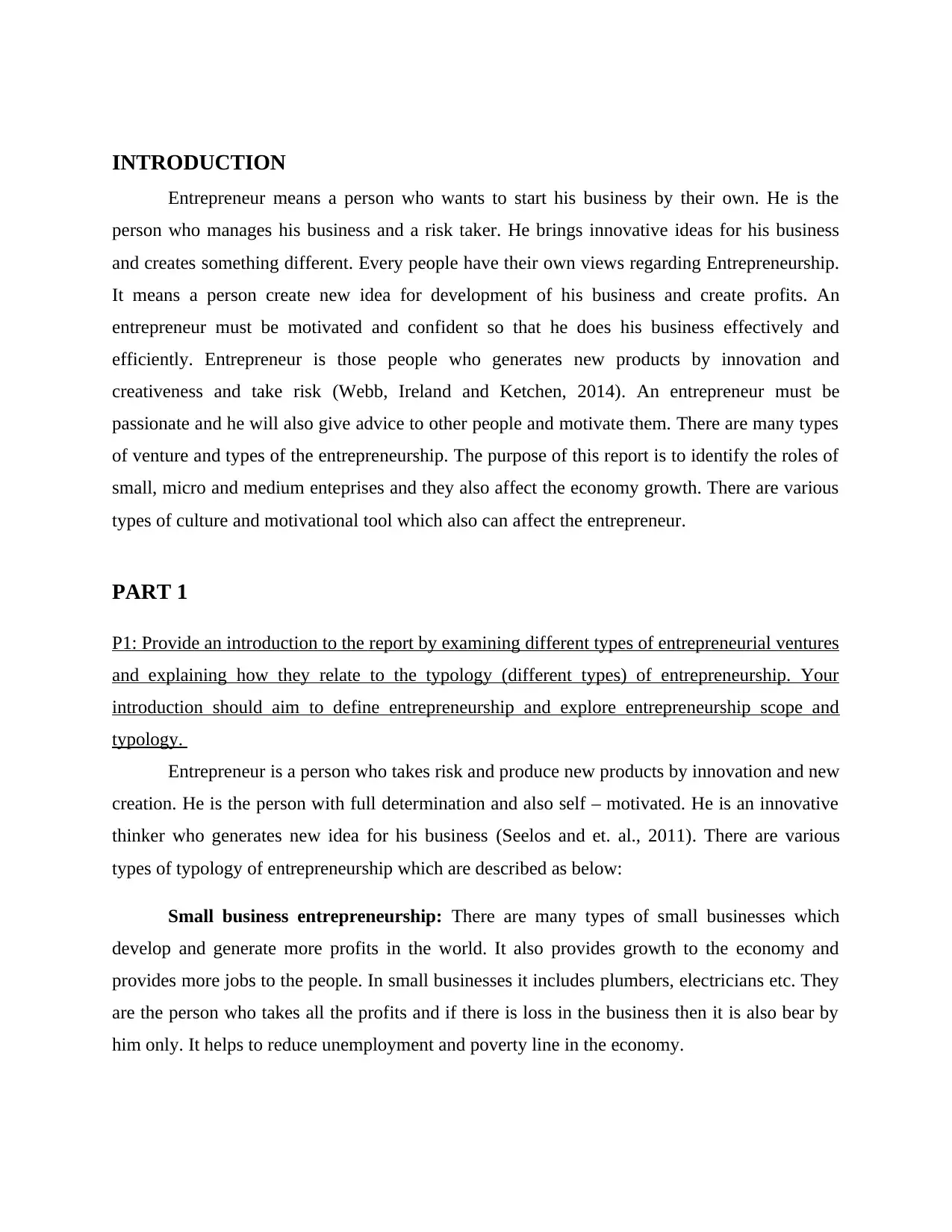
INTRODUCTION
Entrepreneur means a person who wants to start his business by their own. He is the
person who manages his business and a risk taker. He brings innovative ideas for his business
and creates something different. Every people have their own views regarding Entrepreneurship.
It means a person create new idea for development of his business and create profits. An
entrepreneur must be motivated and confident so that he does his business effectively and
efficiently. Entrepreneur is those people who generates new products by innovation and
creativeness and take risk (Webb, Ireland and Ketchen, 2014). An entrepreneur must be
passionate and he will also give advice to other people and motivate them. There are many types
of venture and types of the entrepreneurship. The purpose of this report is to identify the roles of
small, micro and medium enteprises and they also affect the economy growth. There are various
types of culture and motivational tool which also can affect the entrepreneur.
PART 1
P1: Provide an introduction to the report by examining different types of entrepreneurial ventures
and explaining how they relate to the typology (different types) of entrepreneurship. Your
introduction should aim to define entrepreneurship and explore entrepreneurship scope and
typology.
Entrepreneur is a person who takes risk and produce new products by innovation and new
creation. He is the person with full determination and also self – motivated. He is an innovative
thinker who generates new idea for his business (Seelos and et. al., 2011). There are various
types of typology of entrepreneurship which are described as below:
Small business entrepreneurship: There are many types of small businesses which
develop and generate more profits in the world. It also provides growth to the economy and
provides more jobs to the people. In small businesses it includes plumbers, electricians etc. They
are the person who takes all the profits and if there is loss in the business then it is also bear by
him only. It helps to reduce unemployment and poverty line in the economy.
Entrepreneur means a person who wants to start his business by their own. He is the
person who manages his business and a risk taker. He brings innovative ideas for his business
and creates something different. Every people have their own views regarding Entrepreneurship.
It means a person create new idea for development of his business and create profits. An
entrepreneur must be motivated and confident so that he does his business effectively and
efficiently. Entrepreneur is those people who generates new products by innovation and
creativeness and take risk (Webb, Ireland and Ketchen, 2014). An entrepreneur must be
passionate and he will also give advice to other people and motivate them. There are many types
of venture and types of the entrepreneurship. The purpose of this report is to identify the roles of
small, micro and medium enteprises and they also affect the economy growth. There are various
types of culture and motivational tool which also can affect the entrepreneur.
PART 1
P1: Provide an introduction to the report by examining different types of entrepreneurial ventures
and explaining how they relate to the typology (different types) of entrepreneurship. Your
introduction should aim to define entrepreneurship and explore entrepreneurship scope and
typology.
Entrepreneur is a person who takes risk and produce new products by innovation and new
creation. He is the person with full determination and also self – motivated. He is an innovative
thinker who generates new idea for his business (Seelos and et. al., 2011). There are various
types of typology of entrepreneurship which are described as below:
Small business entrepreneurship: There are many types of small businesses which
develop and generate more profits in the world. It also provides growth to the economy and
provides more jobs to the people. In small businesses it includes plumbers, electricians etc. They
are the person who takes all the profits and if there is loss in the business then it is also bear by
him only. It helps to reduce unemployment and poverty line in the economy.
Paraphrase This Document
Need a fresh take? Get an instant paraphrase of this document with our AI Paraphraser
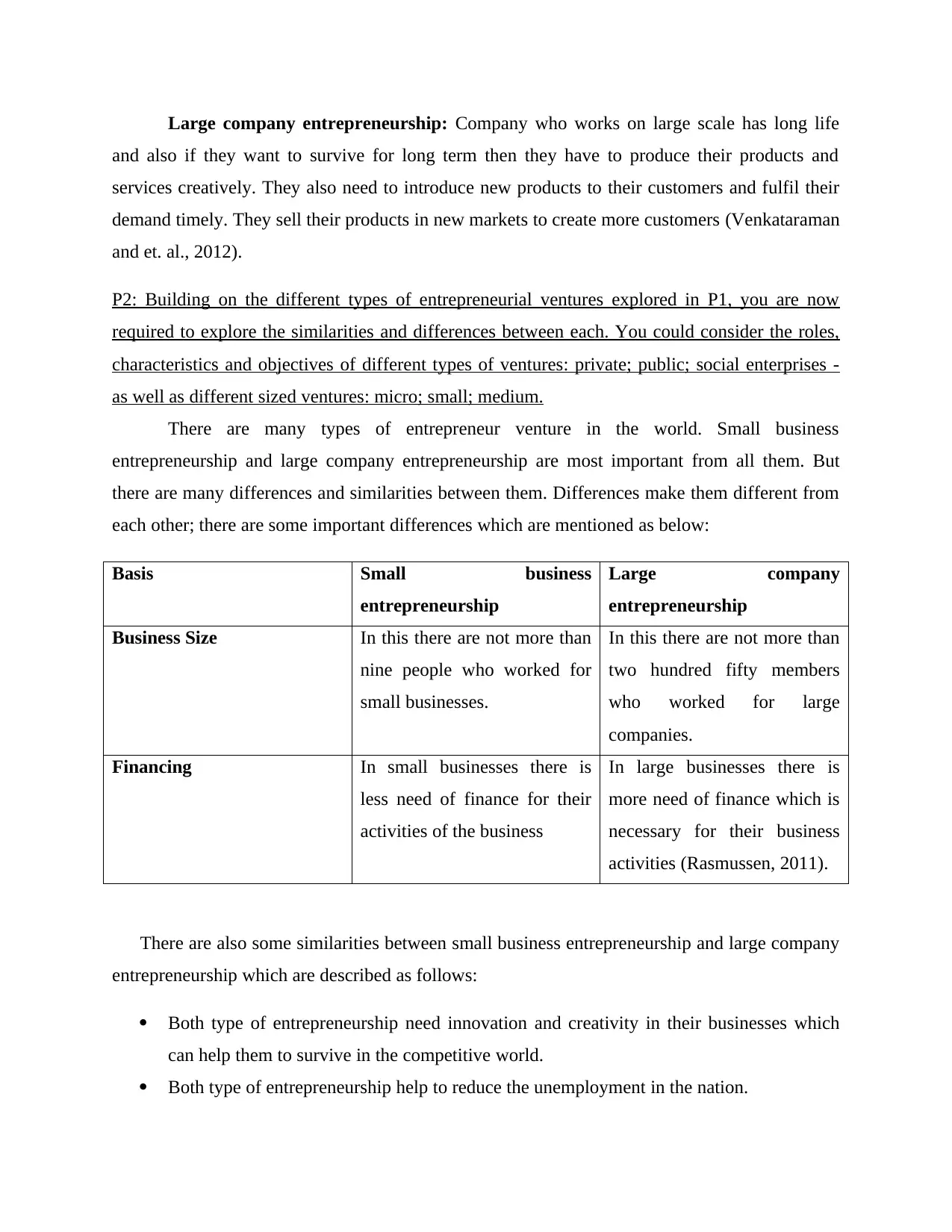
Large company entrepreneurship: Company who works on large scale has long life
and also if they want to survive for long term then they have to produce their products and
services creatively. They also need to introduce new products to their customers and fulfil their
demand timely. They sell their products in new markets to create more customers (Venkataraman
and et. al., 2012).
P2: Building on the different types of entrepreneurial ventures explored in P1, you are now
required to explore the similarities and differences between each. You could consider the roles,
characteristics and objectives of different types of ventures: private; public; social enterprises -
as well as different sized ventures: micro; small; medium.
There are many types of entrepreneur venture in the world. Small business
entrepreneurship and large company entrepreneurship are most important from all them. But
there are many differences and similarities between them. Differences make them different from
each other; there are some important differences which are mentioned as below:
Basis Small business
entrepreneurship
Large company
entrepreneurship
Business Size In this there are not more than
nine people who worked for
small businesses.
In this there are not more than
two hundred fifty members
who worked for large
companies.
Financing In small businesses there is
less need of finance for their
activities of the business
In large businesses there is
more need of finance which is
necessary for their business
activities (Rasmussen, 2011).
There are also some similarities between small business entrepreneurship and large company
entrepreneurship which are described as follows:
Both type of entrepreneurship need innovation and creativity in their businesses which
can help them to survive in the competitive world.
Both type of entrepreneurship help to reduce the unemployment in the nation.
and also if they want to survive for long term then they have to produce their products and
services creatively. They also need to introduce new products to their customers and fulfil their
demand timely. They sell their products in new markets to create more customers (Venkataraman
and et. al., 2012).
P2: Building on the different types of entrepreneurial ventures explored in P1, you are now
required to explore the similarities and differences between each. You could consider the roles,
characteristics and objectives of different types of ventures: private; public; social enterprises -
as well as different sized ventures: micro; small; medium.
There are many types of entrepreneur venture in the world. Small business
entrepreneurship and large company entrepreneurship are most important from all them. But
there are many differences and similarities between them. Differences make them different from
each other; there are some important differences which are mentioned as below:
Basis Small business
entrepreneurship
Large company
entrepreneurship
Business Size In this there are not more than
nine people who worked for
small businesses.
In this there are not more than
two hundred fifty members
who worked for large
companies.
Financing In small businesses there is
less need of finance for their
activities of the business
In large businesses there is
more need of finance which is
necessary for their business
activities (Rasmussen, 2011).
There are also some similarities between small business entrepreneurship and large company
entrepreneurship which are described as follows:
Both type of entrepreneurship need innovation and creativity in their businesses which
can help them to survive in the competitive world.
Both type of entrepreneurship help to reduce the unemployment in the nation.
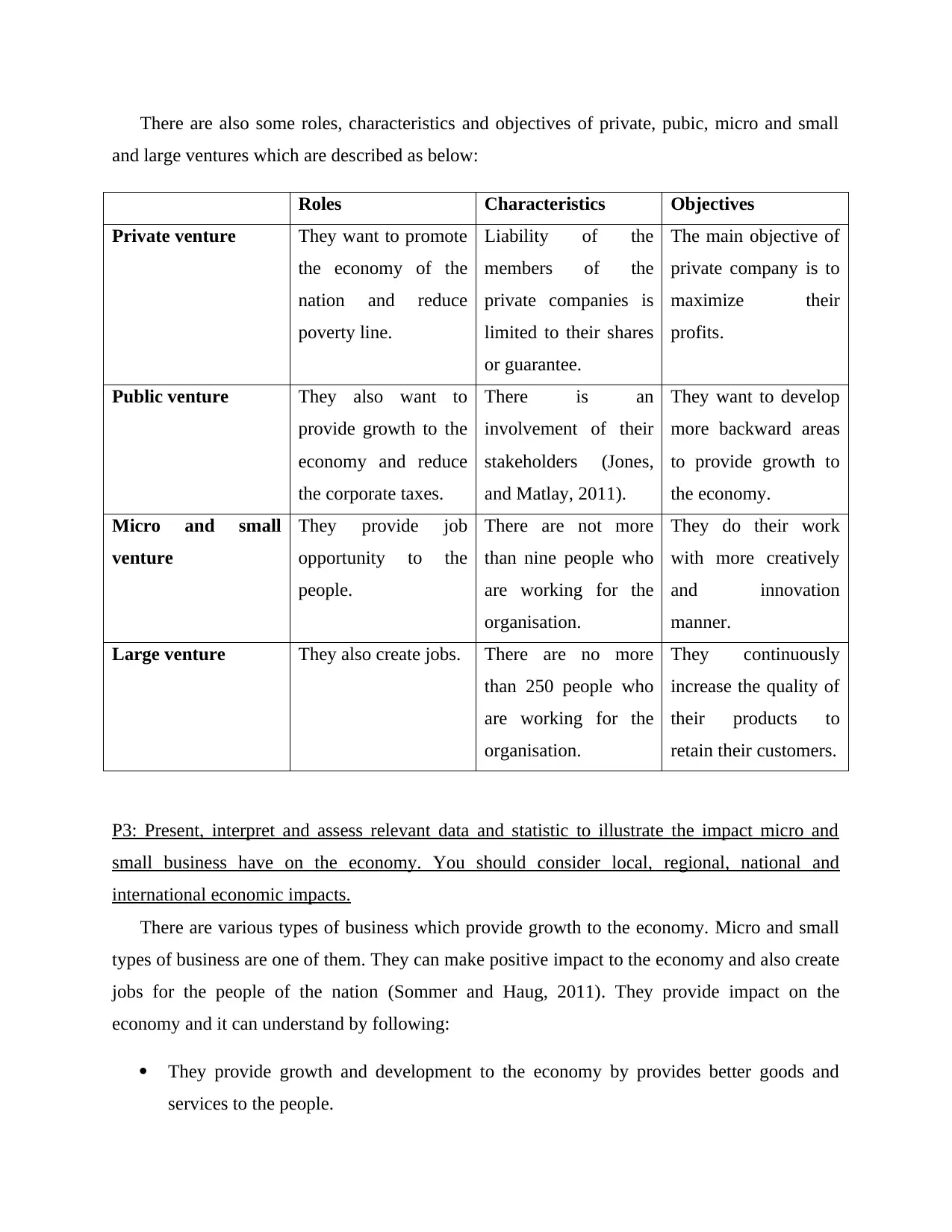
There are also some roles, characteristics and objectives of private, pubic, micro and small
and large ventures which are described as below:
Roles Characteristics Objectives
Private venture They want to promote
the economy of the
nation and reduce
poverty line.
Liability of the
members of the
private companies is
limited to their shares
or guarantee.
The main objective of
private company is to
maximize their
profits.
Public venture They also want to
provide growth to the
economy and reduce
the corporate taxes.
There is an
involvement of their
stakeholders (Jones,
and Matlay, 2011).
They want to develop
more backward areas
to provide growth to
the economy.
Micro and small
venture
They provide job
opportunity to the
people.
There are not more
than nine people who
are working for the
organisation.
They do their work
with more creatively
and innovation
manner.
Large venture They also create jobs. There are no more
than 250 people who
are working for the
organisation.
They continuously
increase the quality of
their products to
retain their customers.
P3: Present, interpret and assess relevant data and statistic to illustrate the impact micro and
small business have on the economy. You should consider local, regional, national and
international economic impacts.
There are various types of business which provide growth to the economy. Micro and small
types of business are one of them. They can make positive impact to the economy and also create
jobs for the people of the nation (Sommer and Haug, 2011). They provide impact on the
economy and it can understand by following:
They provide growth and development to the economy by provides better goods and
services to the people.
and large ventures which are described as below:
Roles Characteristics Objectives
Private venture They want to promote
the economy of the
nation and reduce
poverty line.
Liability of the
members of the
private companies is
limited to their shares
or guarantee.
The main objective of
private company is to
maximize their
profits.
Public venture They also want to
provide growth to the
economy and reduce
the corporate taxes.
There is an
involvement of their
stakeholders (Jones,
and Matlay, 2011).
They want to develop
more backward areas
to provide growth to
the economy.
Micro and small
venture
They provide job
opportunity to the
people.
There are not more
than nine people who
are working for the
organisation.
They do their work
with more creatively
and innovation
manner.
Large venture They also create jobs. There are no more
than 250 people who
are working for the
organisation.
They continuously
increase the quality of
their products to
retain their customers.
P3: Present, interpret and assess relevant data and statistic to illustrate the impact micro and
small business have on the economy. You should consider local, regional, national and
international economic impacts.
There are various types of business which provide growth to the economy. Micro and small
types of business are one of them. They can make positive impact to the economy and also create
jobs for the people of the nation (Sommer and Haug, 2011). They provide impact on the
economy and it can understand by following:
They provide growth and development to the economy by provides better goods and
services to the people.
⊘ This is a preview!⊘
Do you want full access?
Subscribe today to unlock all pages.

Trusted by 1+ million students worldwide
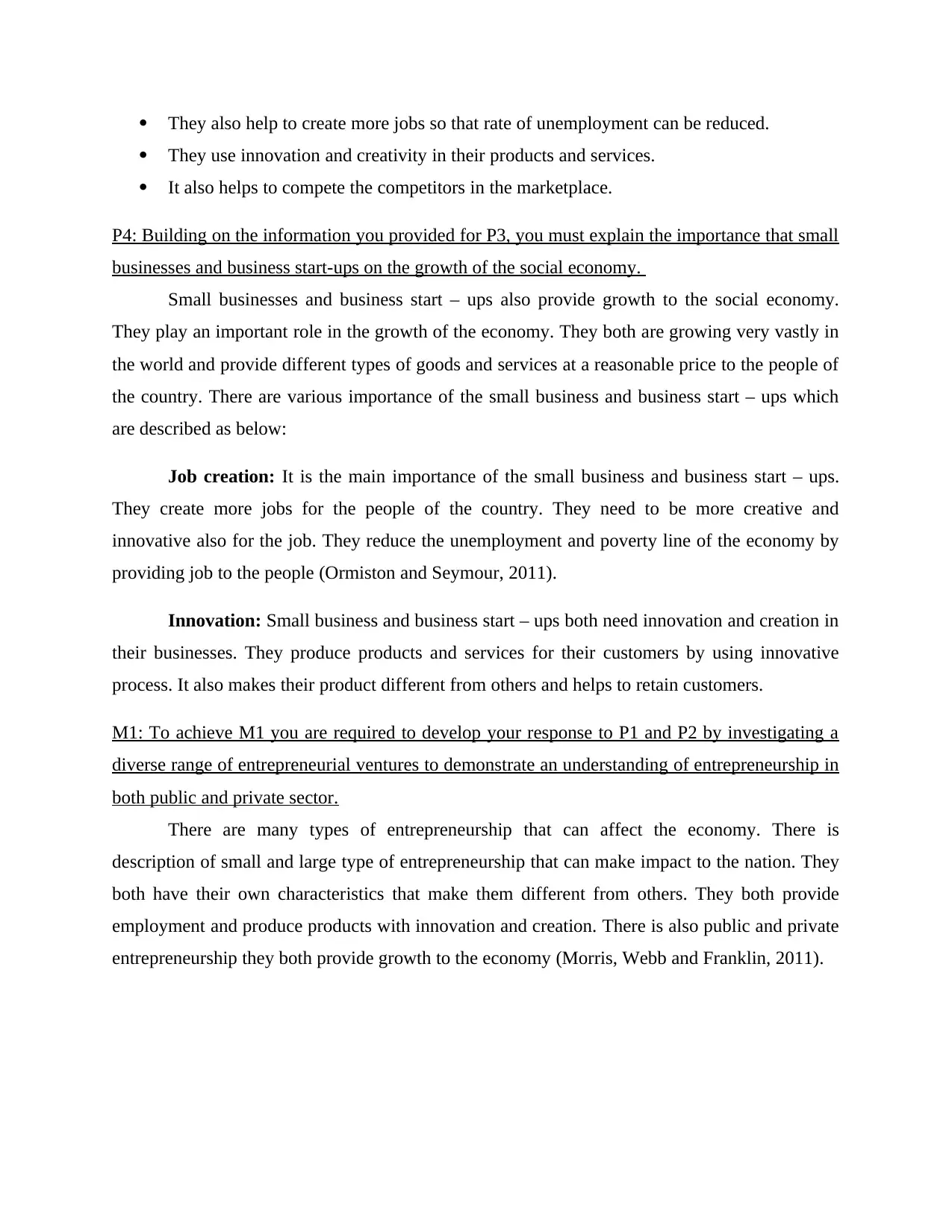
They also help to create more jobs so that rate of unemployment can be reduced.
They use innovation and creativity in their products and services.
It also helps to compete the competitors in the marketplace.
P4: Building on the information you provided for P3, you must explain the importance that small
businesses and business start-ups on the growth of the social economy.
Small businesses and business start – ups also provide growth to the social economy.
They play an important role in the growth of the economy. They both are growing very vastly in
the world and provide different types of goods and services at a reasonable price to the people of
the country. There are various importance of the small business and business start – ups which
are described as below:
Job creation: It is the main importance of the small business and business start – ups.
They create more jobs for the people of the country. They need to be more creative and
innovative also for the job. They reduce the unemployment and poverty line of the economy by
providing job to the people (Ormiston and Seymour, 2011).
Innovation: Small business and business start – ups both need innovation and creation in
their businesses. They produce products and services for their customers by using innovative
process. It also makes their product different from others and helps to retain customers.
M1: To achieve M1 you are required to develop your response to P1 and P2 by investigating a
diverse range of entrepreneurial ventures to demonstrate an understanding of entrepreneurship in
both public and private sector.
There are many types of entrepreneurship that can affect the economy. There is
description of small and large type of entrepreneurship that can make impact to the nation. They
both have their own characteristics that make them different from others. They both provide
employment and produce products with innovation and creation. There is also public and private
entrepreneurship they both provide growth to the economy (Morris, Webb and Franklin, 2011).
They use innovation and creativity in their products and services.
It also helps to compete the competitors in the marketplace.
P4: Building on the information you provided for P3, you must explain the importance that small
businesses and business start-ups on the growth of the social economy.
Small businesses and business start – ups also provide growth to the social economy.
They play an important role in the growth of the economy. They both are growing very vastly in
the world and provide different types of goods and services at a reasonable price to the people of
the country. There are various importance of the small business and business start – ups which
are described as below:
Job creation: It is the main importance of the small business and business start – ups.
They create more jobs for the people of the country. They need to be more creative and
innovative also for the job. They reduce the unemployment and poverty line of the economy by
providing job to the people (Ormiston and Seymour, 2011).
Innovation: Small business and business start – ups both need innovation and creation in
their businesses. They produce products and services for their customers by using innovative
process. It also makes their product different from others and helps to retain customers.
M1: To achieve M1 you are required to develop your response to P1 and P2 by investigating a
diverse range of entrepreneurial ventures to demonstrate an understanding of entrepreneurship in
both public and private sector.
There are many types of entrepreneurship that can affect the economy. There is
description of small and large type of entrepreneurship that can make impact to the nation. They
both have their own characteristics that make them different from others. They both provide
employment and produce products with innovation and creation. There is also public and private
entrepreneurship they both provide growth to the economy (Morris, Webb and Franklin, 2011).
Paraphrase This Document
Need a fresh take? Get an instant paraphrase of this document with our AI Paraphraser
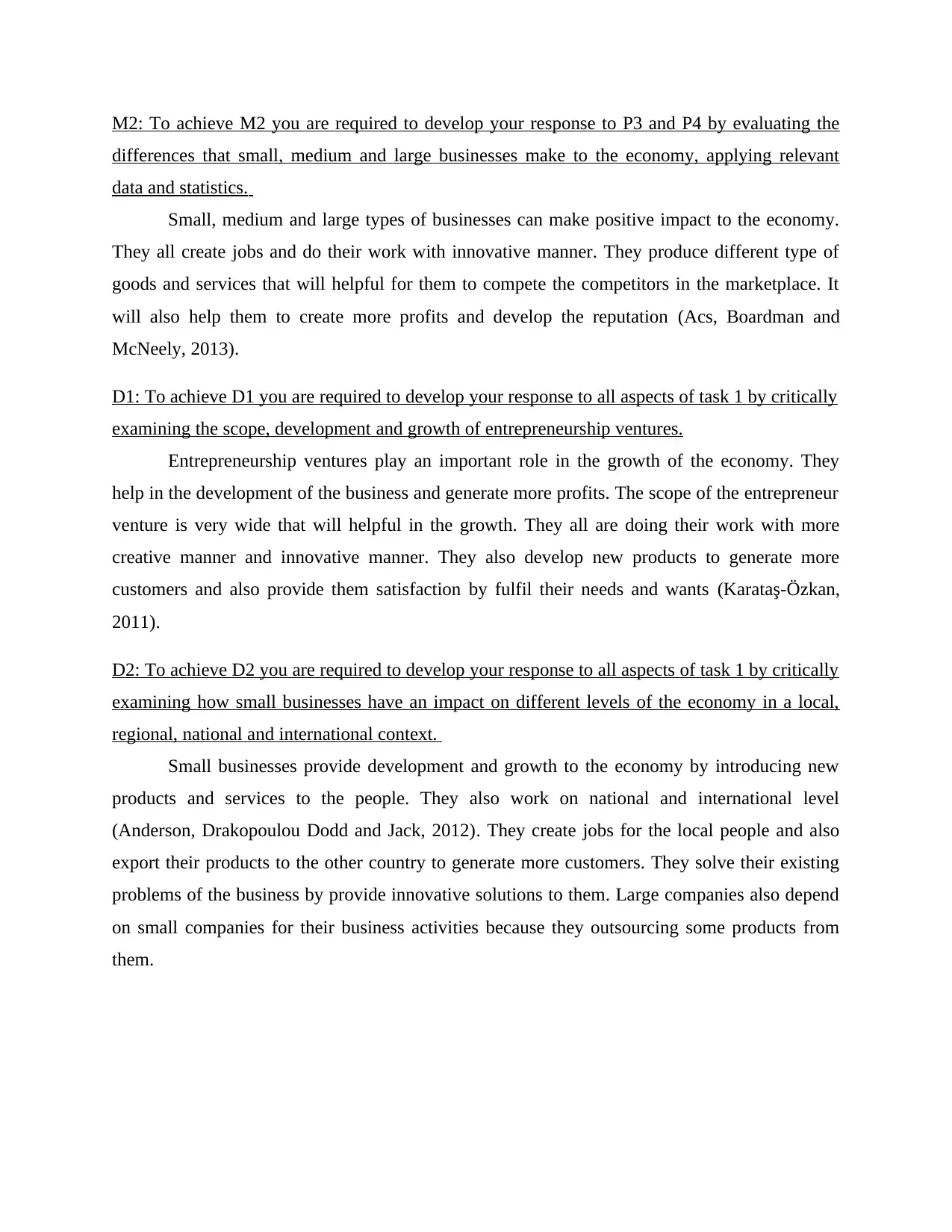
M2: To achieve M2 you are required to develop your response to P3 and P4 by evaluating the
differences that small, medium and large businesses make to the economy, applying relevant
data and statistics.
Small, medium and large types of businesses can make positive impact to the economy.
They all create jobs and do their work with innovative manner. They produce different type of
goods and services that will helpful for them to compete the competitors in the marketplace. It
will also help them to create more profits and develop the reputation (Acs, Boardman and
McNeely, 2013).
D1: To achieve D1 you are required to develop your response to all aspects of task 1 by critically
examining the scope, development and growth of entrepreneurship ventures.
Entrepreneurship ventures play an important role in the growth of the economy. They
help in the development of the business and generate more profits. The scope of the entrepreneur
venture is very wide that will helpful in the growth. They all are doing their work with more
creative manner and innovative manner. They also develop new products to generate more
customers and also provide them satisfaction by fulfil their needs and wants (Karataş-Özkan,
2011).
D2: To achieve D2 you are required to develop your response to all aspects of task 1 by critically
examining how small businesses have an impact on different levels of the economy in a local,
regional, national and international context.
Small businesses provide development and growth to the economy by introducing new
products and services to the people. They also work on national and international level
(Anderson, Drakopoulou Dodd and Jack, 2012). They create jobs for the local people and also
export their products to the other country to generate more customers. They solve their existing
problems of the business by provide innovative solutions to them. Large companies also depend
on small companies for their business activities because they outsourcing some products from
them.
differences that small, medium and large businesses make to the economy, applying relevant
data and statistics.
Small, medium and large types of businesses can make positive impact to the economy.
They all create jobs and do their work with innovative manner. They produce different type of
goods and services that will helpful for them to compete the competitors in the marketplace. It
will also help them to create more profits and develop the reputation (Acs, Boardman and
McNeely, 2013).
D1: To achieve D1 you are required to develop your response to all aspects of task 1 by critically
examining the scope, development and growth of entrepreneurship ventures.
Entrepreneurship ventures play an important role in the growth of the economy. They
help in the development of the business and generate more profits. The scope of the entrepreneur
venture is very wide that will helpful in the growth. They all are doing their work with more
creative manner and innovative manner. They also develop new products to generate more
customers and also provide them satisfaction by fulfil their needs and wants (Karataş-Özkan,
2011).
D2: To achieve D2 you are required to develop your response to all aspects of task 1 by critically
examining how small businesses have an impact on different levels of the economy in a local,
regional, national and international context.
Small businesses provide development and growth to the economy by introducing new
products and services to the people. They also work on national and international level
(Anderson, Drakopoulou Dodd and Jack, 2012). They create jobs for the local people and also
export their products to the other country to generate more customers. They solve their existing
problems of the business by provide innovative solutions to them. Large companies also depend
on small companies for their business activities because they outsourcing some products from
them.
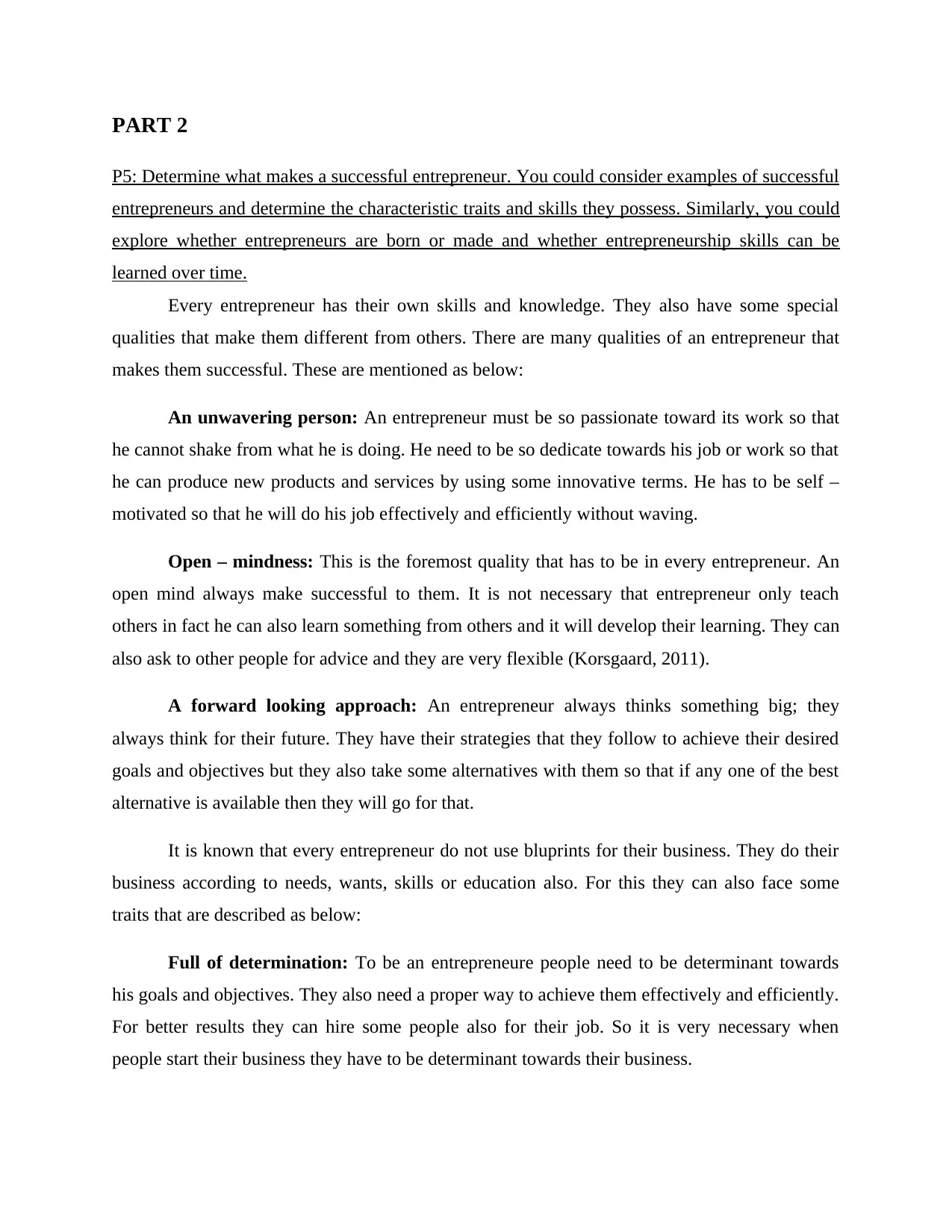
PART 2
P5: Determine what makes a successful entrepreneur. You could consider examples of successful
entrepreneurs and determine the characteristic traits and skills they possess. Similarly, you could
explore whether entrepreneurs are born or made and whether entrepreneurship skills can be
learned over time.
Every entrepreneur has their own skills and knowledge. They also have some special
qualities that make them different from others. There are many qualities of an entrepreneur that
makes them successful. These are mentioned as below:
An unwavering person: An entrepreneur must be so passionate toward its work so that
he cannot shake from what he is doing. He need to be so dedicate towards his job or work so that
he can produce new products and services by using some innovative terms. He has to be self –
motivated so that he will do his job effectively and efficiently without waving.
Open – mindness: This is the foremost quality that has to be in every entrepreneur. An
open mind always make successful to them. It is not necessary that entrepreneur only teach
others in fact he can also learn something from others and it will develop their learning. They can
also ask to other people for advice and they are very flexible (Korsgaard, 2011).
A forward looking approach: An entrepreneur always thinks something big; they
always think for their future. They have their strategies that they follow to achieve their desired
goals and objectives but they also take some alternatives with them so that if any one of the best
alternative is available then they will go for that.
It is known that every entrepreneur do not use bluprints for their business. They do their
business according to needs, wants, skills or education also. For this they can also face some
traits that are described as below:
Full of determination: To be an entrepreneure people need to be determinant towards
his goals and objectives. They also need a proper way to achieve them effectively and efficiently.
For better results they can hire some people also for their job. So it is very necessary when
people start their business they have to be determinant towards their business.
P5: Determine what makes a successful entrepreneur. You could consider examples of successful
entrepreneurs and determine the characteristic traits and skills they possess. Similarly, you could
explore whether entrepreneurs are born or made and whether entrepreneurship skills can be
learned over time.
Every entrepreneur has their own skills and knowledge. They also have some special
qualities that make them different from others. There are many qualities of an entrepreneur that
makes them successful. These are mentioned as below:
An unwavering person: An entrepreneur must be so passionate toward its work so that
he cannot shake from what he is doing. He need to be so dedicate towards his job or work so that
he can produce new products and services by using some innovative terms. He has to be self –
motivated so that he will do his job effectively and efficiently without waving.
Open – mindness: This is the foremost quality that has to be in every entrepreneur. An
open mind always make successful to them. It is not necessary that entrepreneur only teach
others in fact he can also learn something from others and it will develop their learning. They can
also ask to other people for advice and they are very flexible (Korsgaard, 2011).
A forward looking approach: An entrepreneur always thinks something big; they
always think for their future. They have their strategies that they follow to achieve their desired
goals and objectives but they also take some alternatives with them so that if any one of the best
alternative is available then they will go for that.
It is known that every entrepreneur do not use bluprints for their business. They do their
business according to needs, wants, skills or education also. For this they can also face some
traits that are described as below:
Full of determination: To be an entrepreneure people need to be determinant towards
his goals and objectives. They also need a proper way to achieve them effectively and efficiently.
For better results they can hire some people also for their job. So it is very necessary when
people start their business they have to be determinant towards their business.
⊘ This is a preview!⊘
Do you want full access?
Subscribe today to unlock all pages.

Trusted by 1+ million students worldwide
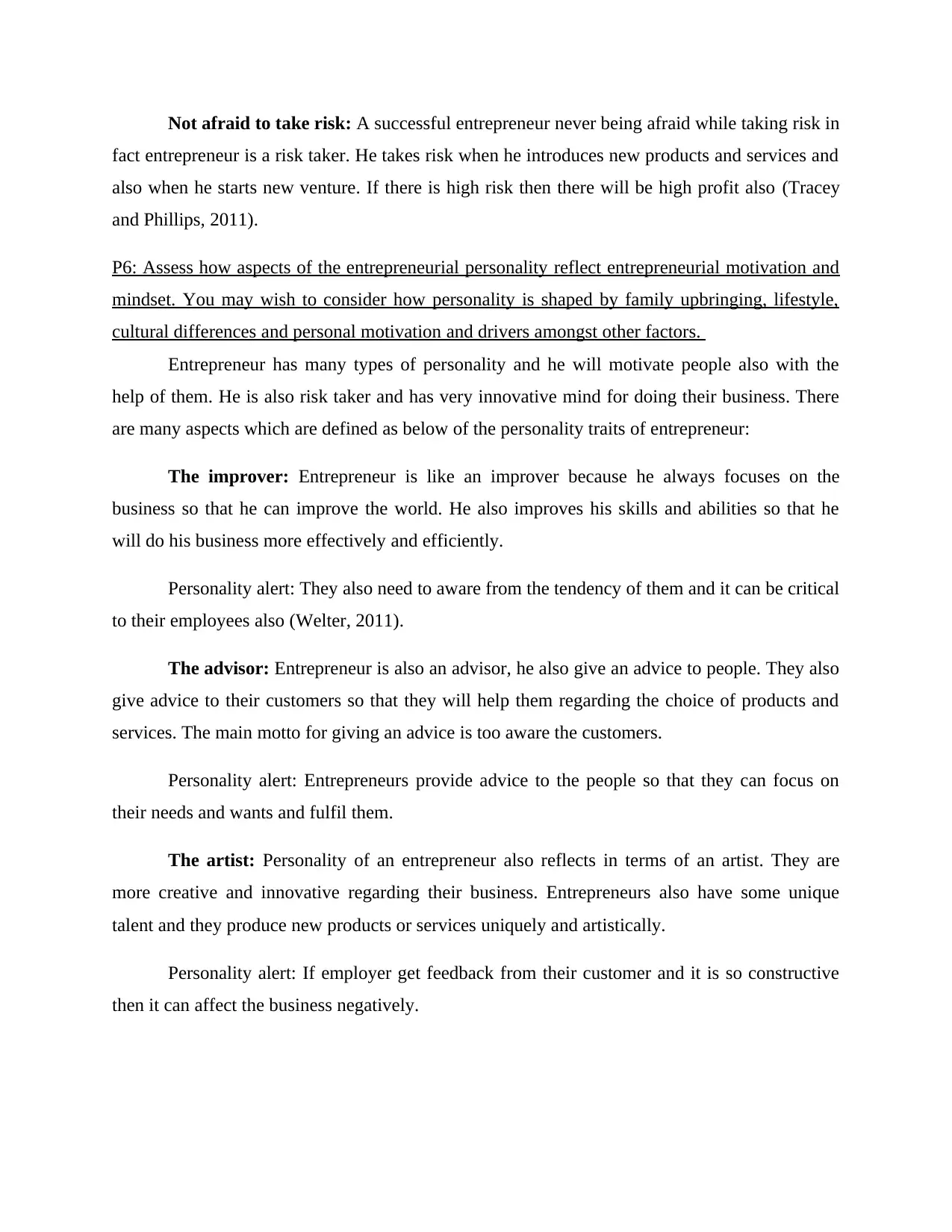
Not afraid to take risk: A successful entrepreneur never being afraid while taking risk in
fact entrepreneur is a risk taker. He takes risk when he introduces new products and services and
also when he starts new venture. If there is high risk then there will be high profit also (Tracey
and Phillips, 2011).
P6: Assess how aspects of the entrepreneurial personality reflect entrepreneurial motivation and
mindset. You may wish to consider how personality is shaped by family upbringing, lifestyle,
cultural differences and personal motivation and drivers amongst other factors.
Entrepreneur has many types of personality and he will motivate people also with the
help of them. He is also risk taker and has very innovative mind for doing their business. There
are many aspects which are defined as below of the personality traits of entrepreneur:
The improver: Entrepreneur is like an improver because he always focuses on the
business so that he can improve the world. He also improves his skills and abilities so that he
will do his business more effectively and efficiently.
Personality alert: They also need to aware from the tendency of them and it can be critical
to their employees also (Welter, 2011).
The advisor: Entrepreneur is also an advisor, he also give an advice to people. They also
give advice to their customers so that they will help them regarding the choice of products and
services. The main motto for giving an advice is too aware the customers.
Personality alert: Entrepreneurs provide advice to the people so that they can focus on
their needs and wants and fulfil them.
The artist: Personality of an entrepreneur also reflects in terms of an artist. They are
more creative and innovative regarding their business. Entrepreneurs also have some unique
talent and they produce new products or services uniquely and artistically.
Personality alert: If employer get feedback from their customer and it is so constructive
then it can affect the business negatively.
fact entrepreneur is a risk taker. He takes risk when he introduces new products and services and
also when he starts new venture. If there is high risk then there will be high profit also (Tracey
and Phillips, 2011).
P6: Assess how aspects of the entrepreneurial personality reflect entrepreneurial motivation and
mindset. You may wish to consider how personality is shaped by family upbringing, lifestyle,
cultural differences and personal motivation and drivers amongst other factors.
Entrepreneur has many types of personality and he will motivate people also with the
help of them. He is also risk taker and has very innovative mind for doing their business. There
are many aspects which are defined as below of the personality traits of entrepreneur:
The improver: Entrepreneur is like an improver because he always focuses on the
business so that he can improve the world. He also improves his skills and abilities so that he
will do his business more effectively and efficiently.
Personality alert: They also need to aware from the tendency of them and it can be critical
to their employees also (Welter, 2011).
The advisor: Entrepreneur is also an advisor, he also give an advice to people. They also
give advice to their customers so that they will help them regarding the choice of products and
services. The main motto for giving an advice is too aware the customers.
Personality alert: Entrepreneurs provide advice to the people so that they can focus on
their needs and wants and fulfil them.
The artist: Personality of an entrepreneur also reflects in terms of an artist. They are
more creative and innovative regarding their business. Entrepreneurs also have some unique
talent and they produce new products or services uniquely and artistically.
Personality alert: If employer get feedback from their customer and it is so constructive
then it can affect the business negatively.
Paraphrase This Document
Need a fresh take? Get an instant paraphrase of this document with our AI Paraphraser
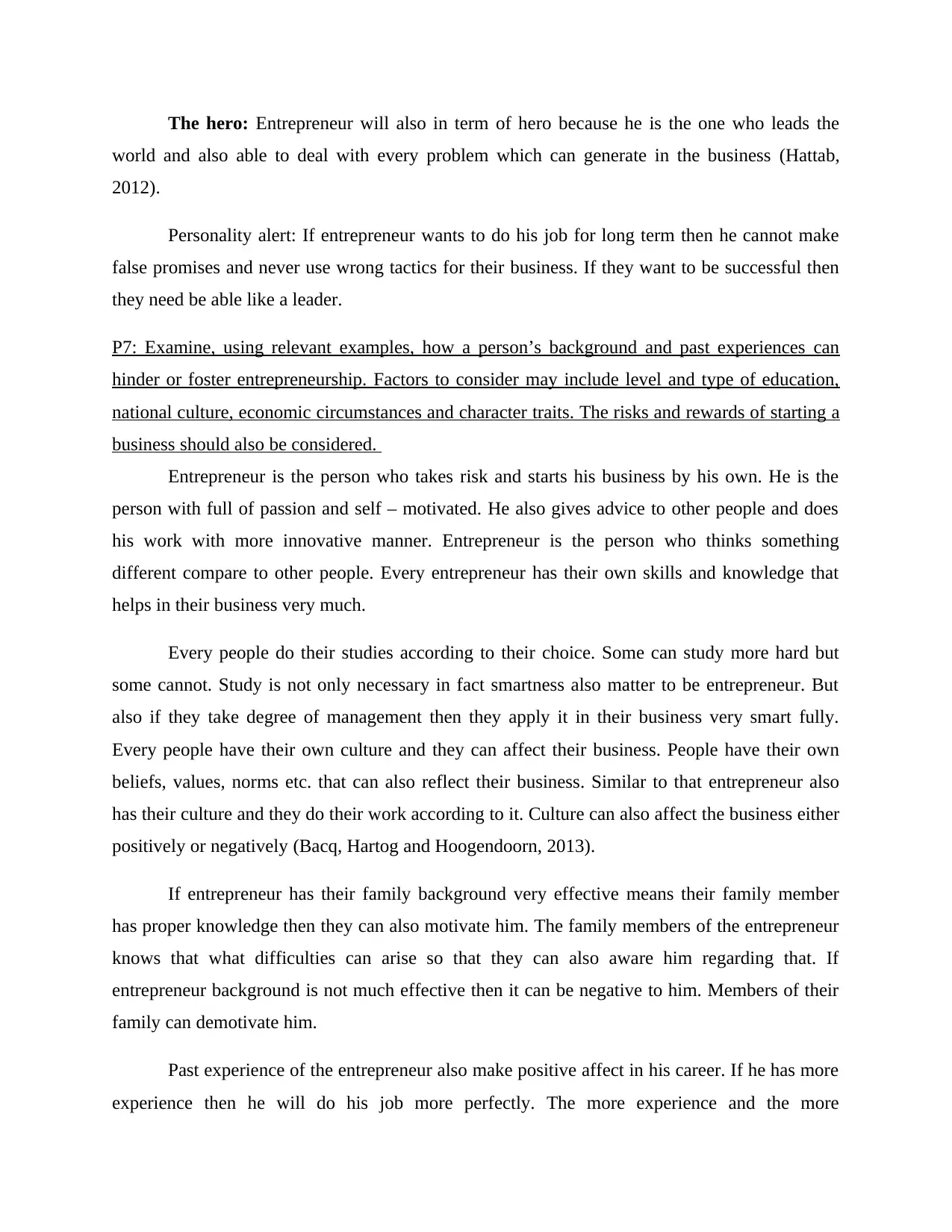
The hero: Entrepreneur will also in term of hero because he is the one who leads the
world and also able to deal with every problem which can generate in the business (Hattab,
2012).
Personality alert: If entrepreneur wants to do his job for long term then he cannot make
false promises and never use wrong tactics for their business. If they want to be successful then
they need be able like a leader.
P7: Examine, using relevant examples, how a person’s background and past experiences can
hinder or foster entrepreneurship. Factors to consider may include level and type of education,
national culture, economic circumstances and character traits. The risks and rewards of starting a
business should also be considered.
Entrepreneur is the person who takes risk and starts his business by his own. He is the
person with full of passion and self – motivated. He also gives advice to other people and does
his work with more innovative manner. Entrepreneur is the person who thinks something
different compare to other people. Every entrepreneur has their own skills and knowledge that
helps in their business very much.
Every people do their studies according to their choice. Some can study more hard but
some cannot. Study is not only necessary in fact smartness also matter to be entrepreneur. But
also if they take degree of management then they apply it in their business very smart fully.
Every people have their own culture and they can affect their business. People have their own
beliefs, values, norms etc. that can also reflect their business. Similar to that entrepreneur also
has their culture and they do their work according to it. Culture can also affect the business either
positively or negatively (Bacq, Hartog and Hoogendoorn, 2013).
If entrepreneur has their family background very effective means their family member
has proper knowledge then they can also motivate him. The family members of the entrepreneur
knows that what difficulties can arise so that they can also aware him regarding that. If
entrepreneur background is not much effective then it can be negative to him. Members of their
family can demotivate him.
Past experience of the entrepreneur also make positive affect in his career. If he has more
experience then he will do his job more perfectly. The more experience and the more
world and also able to deal with every problem which can generate in the business (Hattab,
2012).
Personality alert: If entrepreneur wants to do his job for long term then he cannot make
false promises and never use wrong tactics for their business. If they want to be successful then
they need be able like a leader.
P7: Examine, using relevant examples, how a person’s background and past experiences can
hinder or foster entrepreneurship. Factors to consider may include level and type of education,
national culture, economic circumstances and character traits. The risks and rewards of starting a
business should also be considered.
Entrepreneur is the person who takes risk and starts his business by his own. He is the
person with full of passion and self – motivated. He also gives advice to other people and does
his work with more innovative manner. Entrepreneur is the person who thinks something
different compare to other people. Every entrepreneur has their own skills and knowledge that
helps in their business very much.
Every people do their studies according to their choice. Some can study more hard but
some cannot. Study is not only necessary in fact smartness also matter to be entrepreneur. But
also if they take degree of management then they apply it in their business very smart fully.
Every people have their own culture and they can affect their business. People have their own
beliefs, values, norms etc. that can also reflect their business. Similar to that entrepreneur also
has their culture and they do their work according to it. Culture can also affect the business either
positively or negatively (Bacq, Hartog and Hoogendoorn, 2013).
If entrepreneur has their family background very effective means their family member
has proper knowledge then they can also motivate him. The family members of the entrepreneur
knows that what difficulties can arise so that they can also aware him regarding that. If
entrepreneur background is not much effective then it can be negative to him. Members of their
family can demotivate him.
Past experience of the entrepreneur also make positive affect in his career. If he has more
experience then he will do his job more perfectly. The more experience and the more
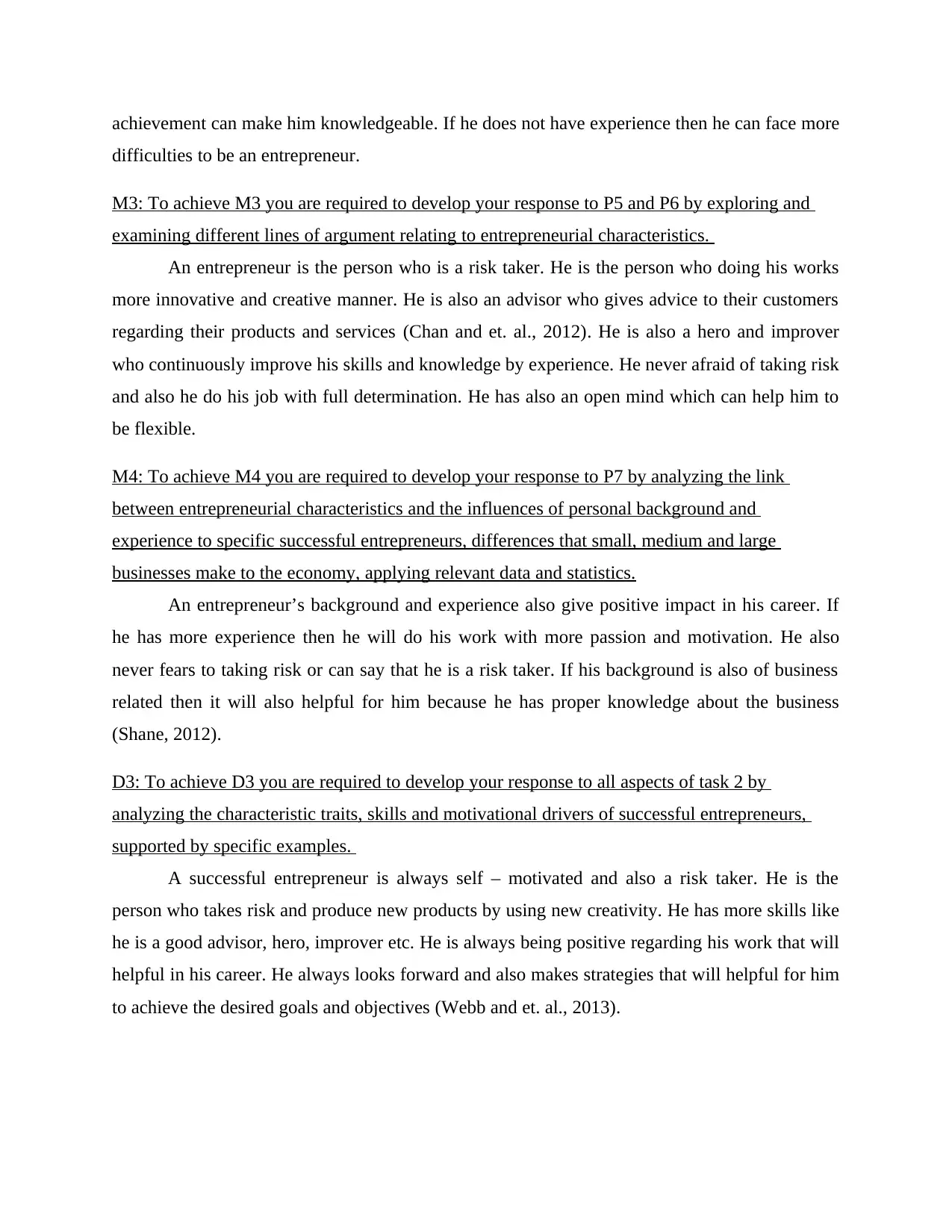
achievement can make him knowledgeable. If he does not have experience then he can face more
difficulties to be an entrepreneur.
M3: To achieve M3 you are required to develop your response to P5 and P6 by exploring and
examining different lines of argument relating to entrepreneurial characteristics.
An entrepreneur is the person who is a risk taker. He is the person who doing his works
more innovative and creative manner. He is also an advisor who gives advice to their customers
regarding their products and services (Chan and et. al., 2012). He is also a hero and improver
who continuously improve his skills and knowledge by experience. He never afraid of taking risk
and also he do his job with full determination. He has also an open mind which can help him to
be flexible.
M4: To achieve M4 you are required to develop your response to P7 by analyzing the link
between entrepreneurial characteristics and the influences of personal background and
experience to specific successful entrepreneurs, differences that small, medium and large
businesses make to the economy, applying relevant data and statistics.
An entrepreneur’s background and experience also give positive impact in his career. If
he has more experience then he will do his work with more passion and motivation. He also
never fears to taking risk or can say that he is a risk taker. If his background is also of business
related then it will also helpful for him because he has proper knowledge about the business
(Shane, 2012).
D3: To achieve D3 you are required to develop your response to all aspects of task 2 by
analyzing the characteristic traits, skills and motivational drivers of successful entrepreneurs,
supported by specific examples.
A successful entrepreneur is always self – motivated and also a risk taker. He is the
person who takes risk and produce new products by using new creativity. He has more skills like
he is a good advisor, hero, improver etc. He is always being positive regarding his work that will
helpful in his career. He always looks forward and also makes strategies that will helpful for him
to achieve the desired goals and objectives (Webb and et. al., 2013).
difficulties to be an entrepreneur.
M3: To achieve M3 you are required to develop your response to P5 and P6 by exploring and
examining different lines of argument relating to entrepreneurial characteristics.
An entrepreneur is the person who is a risk taker. He is the person who doing his works
more innovative and creative manner. He is also an advisor who gives advice to their customers
regarding their products and services (Chan and et. al., 2012). He is also a hero and improver
who continuously improve his skills and knowledge by experience. He never afraid of taking risk
and also he do his job with full determination. He has also an open mind which can help him to
be flexible.
M4: To achieve M4 you are required to develop your response to P7 by analyzing the link
between entrepreneurial characteristics and the influences of personal background and
experience to specific successful entrepreneurs, differences that small, medium and large
businesses make to the economy, applying relevant data and statistics.
An entrepreneur’s background and experience also give positive impact in his career. If
he has more experience then he will do his work with more passion and motivation. He also
never fears to taking risk or can say that he is a risk taker. If his background is also of business
related then it will also helpful for him because he has proper knowledge about the business
(Shane, 2012).
D3: To achieve D3 you are required to develop your response to all aspects of task 2 by
analyzing the characteristic traits, skills and motivational drivers of successful entrepreneurs,
supported by specific examples.
A successful entrepreneur is always self – motivated and also a risk taker. He is the
person who takes risk and produce new products by using new creativity. He has more skills like
he is a good advisor, hero, improver etc. He is always being positive regarding his work that will
helpful in his career. He always looks forward and also makes strategies that will helpful for him
to achieve the desired goals and objectives (Webb and et. al., 2013).
⊘ This is a preview!⊘
Do you want full access?
Subscribe today to unlock all pages.

Trusted by 1+ million students worldwide
1 out of 15
Related Documents
Your All-in-One AI-Powered Toolkit for Academic Success.
+13062052269
info@desklib.com
Available 24*7 on WhatsApp / Email
![[object Object]](/_next/static/media/star-bottom.7253800d.svg)
Unlock your academic potential
Copyright © 2020–2026 A2Z Services. All Rights Reserved. Developed and managed by ZUCOL.





